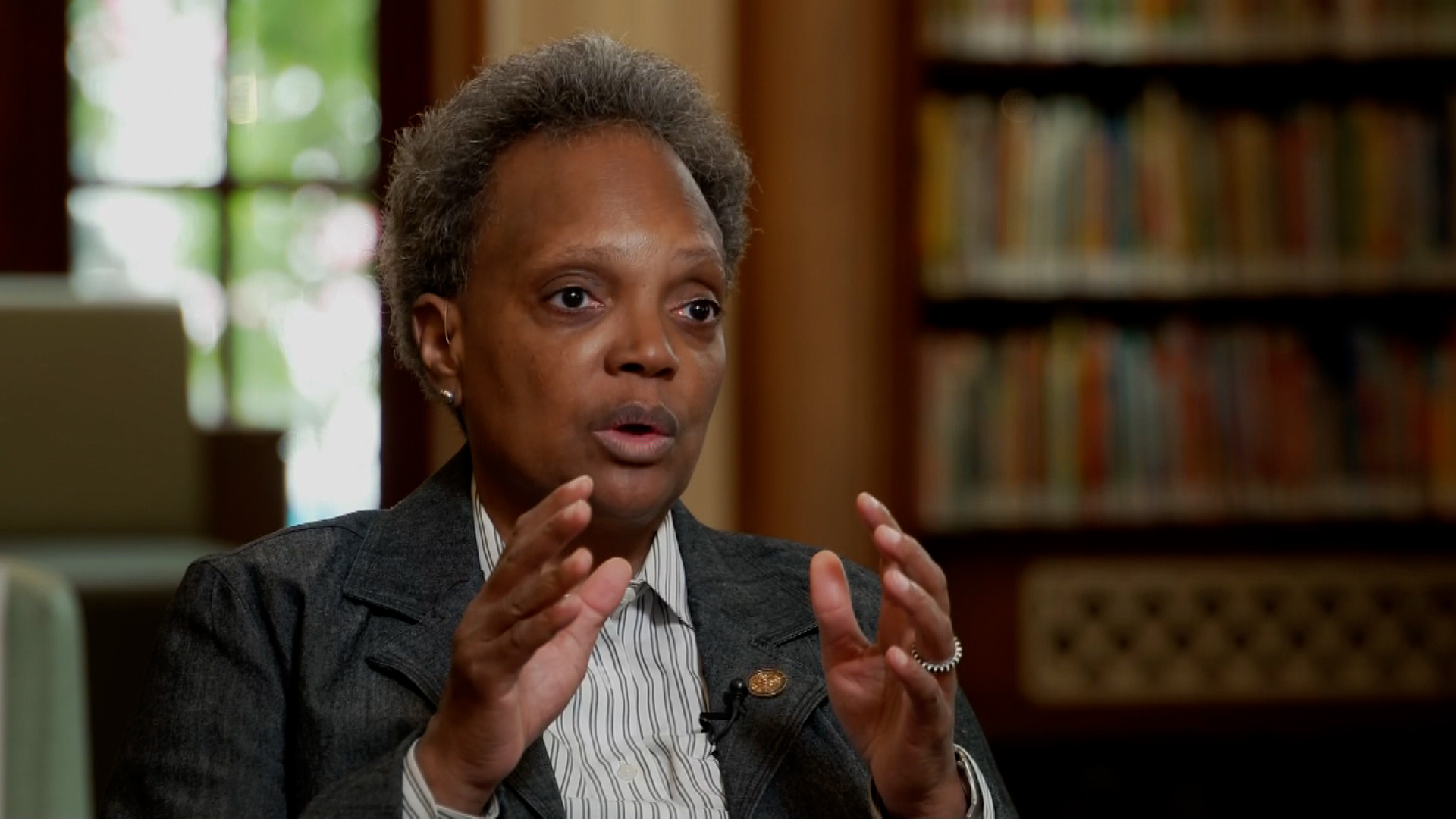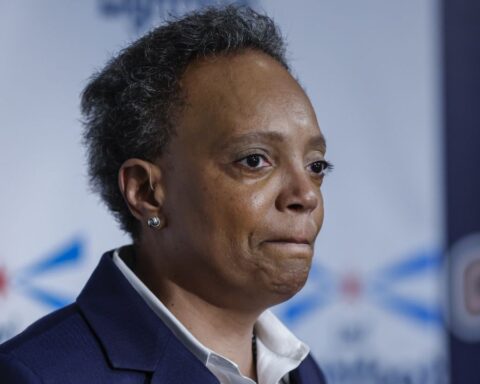Chicago Mayor Lori Lightfoot has been criticized as “racist” — even as a Black woman — and she’s been called “notoriously thin-skinned” but she remains determined to leave a legacy far beyond her time in office.
Still navigating the Covid-19 pandemic and the record surge in violence that came with it, Lightfoot is past her halfway point as mayor, leading the nation’s third largest city. While some find her methods controversial, she finds them necessary.
“It’s not the critics that count,” Lightfoot said as she walked with CNN through Chicago’s West Garfield Park neighborhood, one of the city’s most dangerous. Her security detail remained close by even as numerous people stopped to wave. She was showing the progress of several initiatives within her “whole of government” approach to mitigating violence.
The initiatives in this particular neighborhood are as simple as planting trees and adding green space to constructing a roller rink and a community plaza. They are similar to initiatives in the other 14 stretches of blocks identified by the city as responsible for a disproportionate level of violence across Chicago.
“We’ve got to build these anchors and infrastructure in the communities,” said Lightfoot. “This is an opportunity, really a generational opportunity to make a long-lasting difference. So the next generation of kids that are growing up in this community have a very different trajectory and a very different sensibility about the built environment around them but also what the possibilities are for their own lives.”
TJ Crawford, director of the Garfield Park Rite to Wellness Collaborative, said he believes the mayor is serious about long term change and that, so far, he feels she’s kept her word.
“We can go down a litany of projects that have come and gone from communities and that’s the thing, they come and go. We need to make sure this comes and stays,” said Crawford. “It’s like a ship, it’s not just gonna turn in a moment. We have to really do some things to change the values and beliefs. You have to change the culture.”
‘I got elected to shake things up’
Lightfoot was elected in 2019 as the city’s first Black woman and openly gay mayor. More than two years into the job, the volatility of a pandemic and the surge in violence have complicated her vision for a better Chicago. Some have questioned how she’s handled that stress.
One flashpoint came at a City Council meeting in June when she and a local alderwoman got into a heated confrontation as the meeting recessed.
The editorial board for the Chicago Tribune, which is independent of news reporting, wrote, “There is a line between being principled, which she’d say she is, and being impractical. Lightfoot routinely crosses it — to the detriment of the city she’s been hired to serve.”
Separately, in a January e-mail obtained by a Tribune reporter and authenticated by CNN, a frustrated Lightfoot wrote to a scheduler, “I need office time every day! I need office time every day!” repeating the sentence 16 times in a row. In the same e-mail she wrote, “If this doesn’t change immediately, I will just start unilaterally cancelling things every day,” five times in a row before ending with, “Have I made myself clear, finally?!” repeated 13 times.
According to a CNN review of her schedule that day, the e-mail was sent during scheduled office time. A source within her administration told CNN, “This is who she is.”
“I don’t know what that means, ‘This is who she is’,” said Lightfoot, when asked about the remark. “Am I a demanding boss? Yes I am. But I’m demanding on behalf of the residents of our city. We’ve got to be performing at a high level and I’ve got to set the tone for that.”
Lightfoot set a different tone as she hit her two-year mark as mayor in May. She wrote to reporters that she would “be exclusively providing one-on-one interviews with journalists of color” for the day. Some saw it as a misguided stunt to spotlight a lack of diversity in media, and it set off a firestorm of criticism, including that she was discriminating against reporters and that she doesn’t have the right to choose who covers her.
“The fact that that reaction happened is very, very telling,” said Lightfoot. “In a city that is two-thirds people of color…that we don’t have journalists of color that are covering the Black mayor of the third largest city in the country is an outrage.
“I’m not going to worry about making friends in the media, or accepting the status quo because I don’t want the blowback. No. I got elected to shake things up,” said Lightfoot.
She knows criticism comes with the job, and said she believes the majority of it is because of who she is specifically, but she won’t allow it to deter her in any way from continuing on the path she’s forged.
“I’m a Black woman and I’m a member of the LGBTQ community,” said Lightfoot. “It’s not okay that systemic racism, homophobia, and sexism still exist but I’m going to play the cards that I’m dealt.”
‘If people don’t feel safe, literally nothing else matters’
By the end of 2020, amid Covid-19’s stranglehold on the world, violence had surged in Chicago. Murders jumped 55 percent in 2020 compared to 2019 and, in an even more significant indicator of a trend in violence, shootings went up roughly 52% as the number of shooting victims surged by 55%.
“The ecosystem of public safety that isn’t just law enforcement but is local community based, they too have really been hit hard by Covid,” she told CNN in 2020, amid a Fourth of July weekend during which 67 people were shot, 13 of them fatally.
Some of that violence spilled over into 2021.
Despite some improvements compared to the spike of last year, murder is still up 48% compared to pre-pandemic levels with shootings up more than 60%, according to data from the Chicago Police Department.
In 2019, amid a decline in violence in the city for a third year in a row, Lightfoot told CNN, “The perception and the reality of safety are really, really important.”
Two years later, the concept holds.
“If people don’t feel safe, literally nothing else matters,” said Lightfoot. “I know that, I own responsibility for that along with every other stakeholder in our city. We’ve got to be united and move forward together to address these issues.”
That call for unity comes amid a dynamic of local finger pointing at times between Lightfoot and the Chicago Police Department back and forth with the judicial system over core difficulties in driving violence down. But the call for unity also includes a need for support at the federal level.
After clashing with the previous administration, Lightfoot is more optimistic about working with the current one. She met with President Joe Biden during his visit to Chicago in early July.
“We need gun trafficking multi-jurisdictional strike forces to disrupt the flow of illegal guns that are coming into our city,” Lightfoot told CNN. “I and other mayors across the country have been beating this drum since day one of his presidency…my expectation is that those strike forces will be at work here shortly.”
Attorney General Merrick Garland planned to travel to Chicago on Thursday to highlight the Justice Department’s new anti-gun trafficking initiative focused on five cities, including Chicago, as the Biden administration faces political pressure to deal with spikes in crime.
In addition to Chicago, the department launched anti-gun trafficking strike forces to be based in Los Angeles, New York, the San Francisco Bay area and Washington, DC. All are known corridors where illegal guns are being trafficked and used in deadly shootings and other crimes.
‘We will move as fast as the trust builds’
Even with a pandemic, surges in violence, two historic standoffs with the Chicago Teachers Union, accusations of covering up controversial body camera footage, fights over police reform, and more, Lightfoot is still standing and remains optimistic about the future of Chicago.
On Wednesday Lightfoot and the City Council passed legislation to create a civilian oversight body for the Chicago Police Department, an issue she campaigned on but failed to find agreement for until now. It establishes a seven-member commission that can, among other things, help create policy with the police department, recommend candidates for police superintendent, and more.
“The police have several layers of oversight already,” said John Catanzara, the local president of the Fraternal Order of Police, during a City Council Committee on Public Safety meeting Tuesday, a day prior to the full council vote. “I don’t know what you think you’re going to get from a police force when you keep laying the blame for what’s wrong in this city at their feet.”
Lightfoot will retain the ability to ultimately hire and fire the department’s top cop, but she called the moment a “significant milestone in our mission of bringing further transparency to our police department and its accountability agencies,” and even more significantly in her eyes, building community trust.
When asked if she would run for mayor again she said, “What I’ve got to be focused on is this generation of kids, not the next election, the next generation. That’s what I’m focused on.” She never answered yes or no.
Back in Chicago’s West Garfield Park neighborhood, she hopes the effort in investment sets a standard for well after she’s left office and that the people in these neighborhoods accept nothing less.
“There has been and will continue to be skepticism. Is this real? Are you just doing this for the cameras? No, it’s real. And we’re going to continue to be here rain or shine because I know that if we can change the fortunes of this neighborhood, we can do it anywhere in the city,” said Lightfoot. “We will move as fast as the trust builds.”




